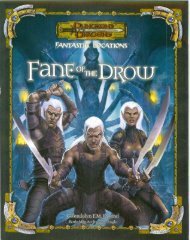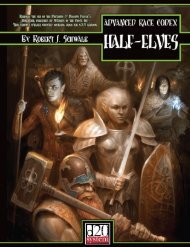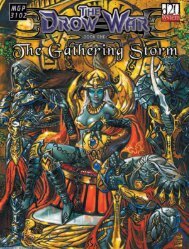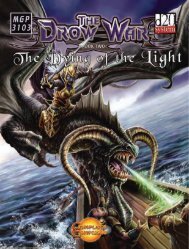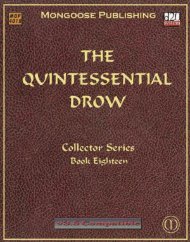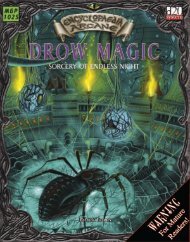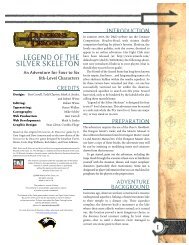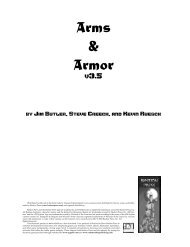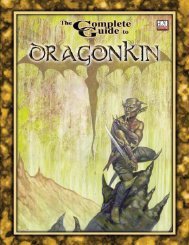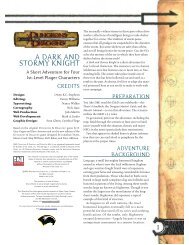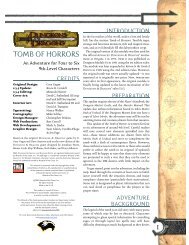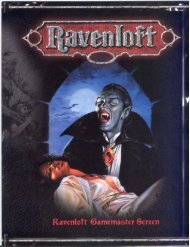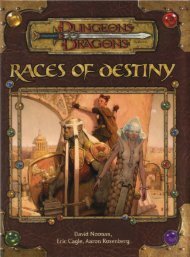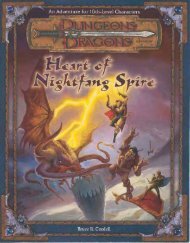Create successful ePaper yourself
Turn your PDF publications into a flip-book with our unique Google optimized e-Paper software.
38<br />
Worshippers<br />
<strong>The</strong> worshippers of Kez’Skul are many, but those solely<br />
devoted to him are comparatively few. For example, a<br />
wealthy merchant may pray to the Trickster for help in<br />
the Game of Bones while maintaining Alsythuth as his<br />
foremost god, just as a commander offers supplication to<br />
the Trickster that his flanking manoeuvre might succeed<br />
and fool the enemy while reserving his greater reverence<br />
for Thraud.<br />
This is not always the case, of course. Though not so many<br />
as those who give Kez’Skul only a part of their worship,<br />
there are those drow outside the clergy who are dedicated<br />
to him utterly. Like the members of the priesthood, these<br />
drow come from all walks of life, from the Noble House<br />
prince obsessed with the Game of Bones to the common<br />
con artist working his trade in the grimy back alleys of the<br />
city.<br />
Mu’Ushket (<strong>The</strong> Knife in the<br />
Dark)<br />
Symbol: A field of black with an indistinct grey face inside<br />
it.<br />
Alignment: Chaotic Neutral<br />
Governs: Assassins, secrets, shadow, stealth<br />
Domains: Chaos, Death, Trickery<br />
Favoured Weapons: Hand crossbow, short sword<br />
Requirements for Priesthood: Must have at least one<br />
level of rogue<br />
Background<br />
Worship of Mu’Ushket is uncommon and his<br />
temples few in drow society. <strong>The</strong> primary<br />
reason for this is not his sphere of influence,<br />
as drow have no objections to assassinations<br />
except when directed at them personally.<br />
Rather, Mu’Ushket is an outsider among<br />
the gods themselves, or so it is believed.<br />
Though the gods do not speak directly<br />
on this, or at least the priests have<br />
not conveyed such speech, Mu’Ushket is<br />
considered an outsider by the gods of the drow.<br />
According to legend, Mu’Ushket was born a mortal<br />
drow like any other but, through a life of scheming<br />
and stealthy acquisitions, he gained enormous power.<br />
Eventually, he chose to tread the perilous path towards<br />
godhood and succeeded where all other drow have failed.<br />
This is considered an unlikely claim by many. That<br />
Mu’Ushket seems to be an outsider among the gods of<br />
the drow pantheon is undeniable, but those who doubt the<br />
mortal roots of the Knife in the Dark believe he is simply<br />
another god who has chosen to attach himself to the drow.<br />
It is left to Games Masters to decide which of these beliefs,<br />
if either, is correct.<br />
Whatever the truth of his origins, it is undeniable that<br />
Mu’Ushket has become a force in drow society and is a<br />
popular god among some elements of the lower classes.<br />
His control over shadows, stealth and secrets make him a<br />
natural divinity for assassins and thieves, whose worship he<br />
has almost entirely lured away from Kez’Skul the Deceiver.<br />
Mu’Ushket seems to return the hostile feelings of the other<br />
gods in the drow pantheon, and his cult has no relations<br />
with the churches of other deities. Mu’Ushket is protective<br />
of his worshippers, and watches them closely.<br />
Religious Observances<br />
<strong>The</strong>re are no formalised rituals or observances involving<br />
multiple worshippers in the cult of Mu’Ushket, no sacred<br />
occasions on which his followers gather in great numbers.<br />
Considering that secrecy is one of the primary interests of<br />
Mu’Ushket, this is hardly surprising, as it is difficult to to<br />
keep a large gathering a secret, especially in drow society.<br />
<strong>The</strong> Knife in the Dark does accept sacrifices, but not<br />
through the usual means. Rather, any act of thievery by<br />
a worshipper of Mu’Ushket is considered a sacrifice<br />
(provided a portion of the spoils go to the church) and any<br />
assassination carried out by a follower of Mu’Ushket is<br />
also counted as a sacrifice (again, assuming some portion<br />
of the fee goes to the church).<br />
Temples<br />
<strong>The</strong> cult of Mu’Ushket does not maintain<br />
temples in drow cities in the usual sense.<br />
That is, there are no imposing edifices<br />
towering towards the stalactites, inlaid with<br />
holy symbols and proclaiming publicly the<br />
strength of the god. A deity of stealth and<br />
secrecy has no interest in such an obvious<br />
and vulnerable place of worship.<br />
Instead, temples to the Knife in the Dark<br />
are maintained in secret. <strong>The</strong>y are located in<br />
old cellars, hidden meeting rooms, even out in the<br />
Underdeep itself. When worshippers gather, they do so<br />
in small groups, never more than a handful, in a meeting<br />
place referred to as a Den.<br />
<strong>The</strong>re are persistent rumours of a large temple to Mu’Ushket<br />
hidden somewhere in the Underdeep, shrouded perpetually<br />
in magical darkness and home to dozens of Knives and<br />
priests. Some rumours even claim that an avatar of the



